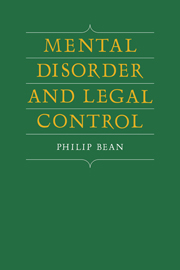Book contents
- Frontmatter
- Contents
- Preface
- Chapter 1 Mental health legislation
- Section I The admission of patients to mental hospitals
- Section II Control of patients in the hospital and community
- Section III Patients' rights
- Chapter 8 Consent and treatment
- Chapter 9 Mental patients' rights and legal redress
- Chapter 10 The effectiveness of legal rights
- Section IV Conclusion
- Notes
- Index
Chapter 8 - Consent and treatment
from Section III - Patients' rights
Published online by Cambridge University Press: 06 July 2010
- Frontmatter
- Contents
- Preface
- Chapter 1 Mental health legislation
- Section I The admission of patients to mental hospitals
- Section II Control of patients in the hospital and community
- Section III Patients' rights
- Chapter 8 Consent and treatment
- Chapter 9 Mental patients' rights and legal redress
- Chapter 10 The effectiveness of legal rights
- Section IV Conclusion
- Notes
- Index
Summary
It may seem a paradox, even a contradiction perhaps, to talk of consent and psychiatric treatment at one and the same time. If so then perhaps we need to recognise further the influence of earlier legislation which defined much of our thinking. The 1890 Lunacy Act for example, gave medical superintendents powers to administer treatments to certified patients without the patient's consent. These powers were simply transferred to the 1959 Act, according to the official interpretation at the time. Under the 1959 Act, or more specifically under Section 26 the treatment order, patients could be given all forms of treatment without their consent. At that time this was considered a normal and appropriate procedure, and indeed was so until quite recently.
Certainly the 1959 Act said nothing specifically about consent. But then, it wouldn't: consent was not part of the prevailing world view. The right to receive treatment was seen as more important, for treatment it was thought would enable patients to live more happy and useful lives. It is interesting therefore to see how consent was ignored. The Percy Commission justified compulsory detention according to the nature of mental disorders: that is patients may not know they are ill, and if they are unwilling to receive the form of care considered necessary there was a strong likelihood that unwillingness was due to a lack of appreciation of their condition, deriving from the mental disorder itself.
- Type
- Chapter
- Information
- Mental Disorder and Legal Control , pp. 129 - 150Publisher: Cambridge University PressPrint publication year: 1986



